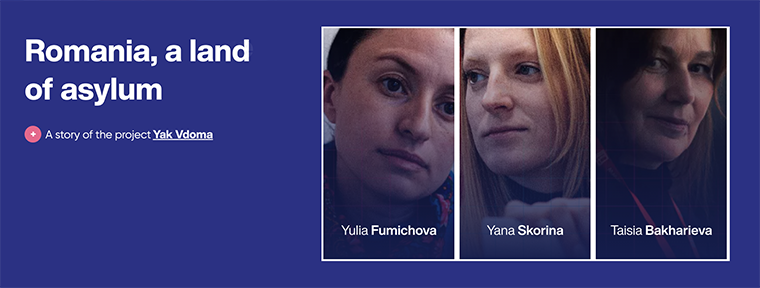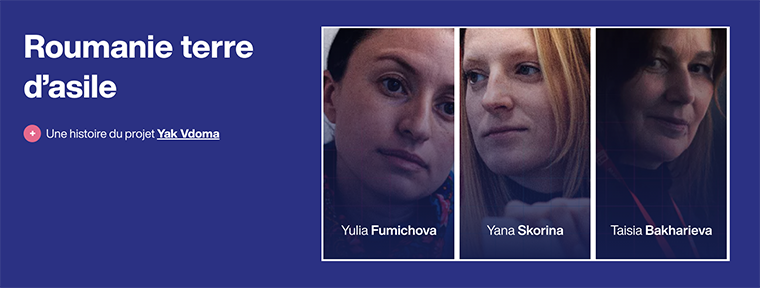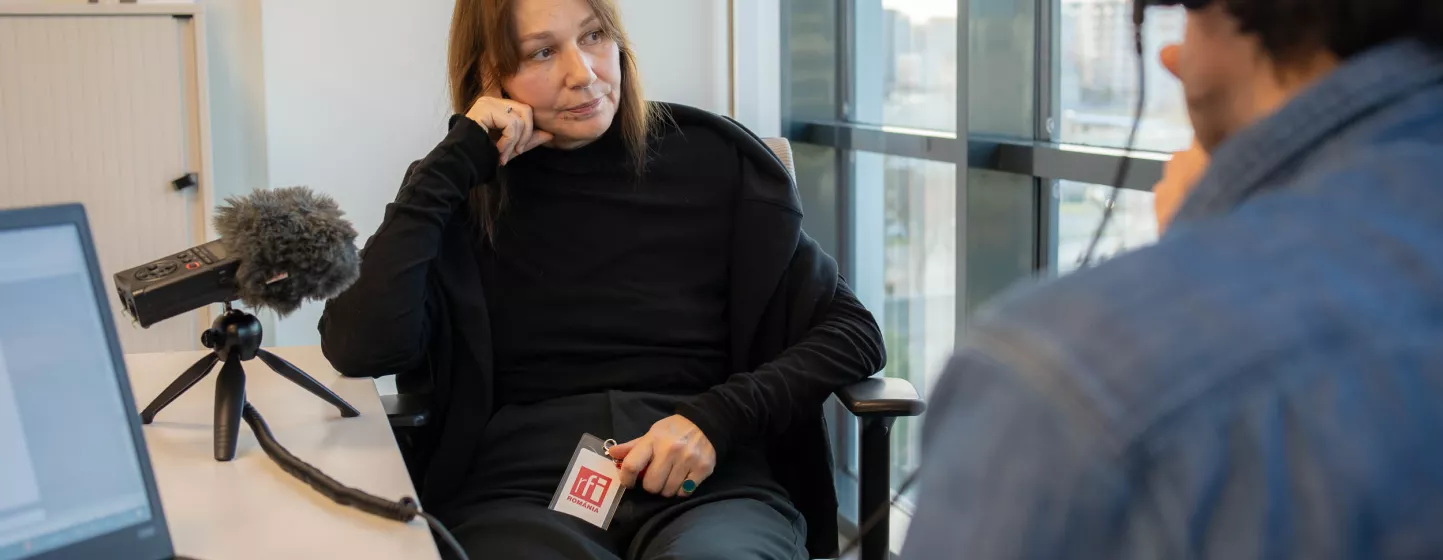Taisia Bakharieva, a spokesperson for female war reporters
Taisia Bakharieva gives a voice to the Ukrainian women covering the war at the front. Based in Bucharest, the journalist recounts her fascination for the women she affectionately refers to as her "heroines".
She too has had to reinvent herself professionally. Before the war, in Kiev, Taisia used to interview "stars" as she recalls, directors in particular - for TV. Today, Taisia finds the word "star" almost stale since she now looks after real "heroines" as she calls the female correspondents working on the front for Ukrainian television. She began in 2014, and it has become her main editorial project since February 2022.
"For me, they are heroines because they've made a choice − a very significant one − for them and their families. In fact, that's how I address them, I call them "my heroines". I'm here, and they're at the front," she murmurs gravely, before explaining that she "couldn't have had that kind of courage."
Nor is she the same age as them. Most of these women are aged between 30 and 40, while Taisia is 56. In a gentle voice, she talks about her own usefulness from a distance, not embarrassed but modest, aware that she is simply doing her job by making these women's voices heard. They fascinate her and she has followed them daily since the Russian invasion.
Taisia has spent the last two months in Bucharest (a "welcoming" city in her words), where she has rediscovered the simple pleasures of a life far from the alarms, enjoying a walk outside in the evening, going for a coffee in safety. She has also spent these couple of months, "accompanying her heroines step by step in order to analyse their psychological changes and trying to grasp what they feel to their very core."
Taisia finds the idea of not following what's going on there at every moment to be inconceivable. "In fact, if I'm honest, it eats away at me all the time," she admits.
The double challenge of being a woman and a war reporter
Having come to Romania on her own (her daughter, who is studying, and her husband, who "does voluntary work and walks the dog," as she puts it, are in Kiev), Taisia is driven by the desire to understand these women who have chosen such a dangerous and arduous job. She depicts them in a quiet but confident voice, so that we can imagine them.
"Each of my heroines tells me how much she dislikes wearing a helmet because it hurts her throat; they're too big because the size was calculated for men's heads. They have also had to get used to the heavy body armour, which they are required to wear at all times, but it hurts their backs. Fortunately, the jackets have been embroidered with Ukrainian motifs, which soothes their souls and helps them put up with all the paraphernalia," recounts Taisia with infinite patience, as if starting a tale full of wondrous characters.
These young women are actually a handful on the scale of the conflict. "Twelve, fifteen at the most," according to the journalist. One of them is an operator and has to contend with carrying all her equipment. According to Taisia, she is the only female operator in the field.
All are alive today. "Thank God, no one's injured, despite the bullets raining down," adds Taisia. It's almost a miracle. "In 2014, nobody knew what it meant to travel to the front, nobody knew what war journalism was. Initially, these women went out without helmets or bullet-proof jackets, they learnt on the job," explains Taisia, adding that the country soon began to organise training courses for its war reporters. Some had been to Georgia in 2008, but it had only been men back then.
An entire profession united in the face of war
While she prefers to talk about the harsh conditions and solidarity at the front, Taisia also feels "these women's hatred towards those further back, who pretend that the war doesn't exist." Obsessed with victory, these women have developed "a strange syndrome; they recognise they have it, but don't want a cure," explains the journalist, who knows that they "swear by the end of the war and their country's victory, whatever the cost."
What do these women dream of for the future? "Most of them say they want to head off to an island far away from humanity and other people," admits Taisia, who knows they are exhausted but determined to go all the way.
The journalist plans to stay in Bucharest until April. Despite the comfort of not risking her life, Taisia believes that all Ukrainian journalists today, wherever they may be, are war reporters in some way. "Absolutely everyone is writing about war at the moment," she says. A necessity for their country at a time when the sector has been hard hit by high unemployment since the Russian invasion. As a result, many of them continue to work without pay. The media outlet for which Taisia works came very close to closing down recently, but here too the journalists said they wanted to stick together and carry on even if they were no longer being paid. Like her heroines, Taisia also has a dream for her country, "that Putin's ailing regime collapses and that Ukrainians become the heroes of the whole of Europe."

Une profession entière solidaire face à la guerre
Si du front elle préfère retenir la rudesse mais aussi la solidarité, Taisia ressent aussi « la haine de ces femmes à l'égard de ceux, plus en retrait, qui font comme si la guerre n'existait pas ». Obnubilées par la victoire, elles ont développé « ce syndrome étrange, dont elles sont conscientes par ailleurs mais ne veulent pas se soigner, estime la journaliste qui les sait ne jurer que par la fin de la guerre et la victoire de leur pays, quel qu’en soit le prix ».À quoi rêvent ces femmes pour l'après ? « La majorité disent vouloir partir sur une île où n'existerait à la fois ni l'humanité ni d'autres hommes », avoue Taisia qui les sait exténuées mais déterminées à aller jusqu'au bout.
La journaliste restera à Bucarest jusqu'en avril. Malgré le confort de ne pas risquer sa vie, Taisia estime que tous les journalistes ukrainiens et ukrainiennes où qu'ils et elles soient aujourd’hui, sont des journalistes de guerre d'une certaine façon. « Absolument tous écrivent sur la guerre à l'heure actuelle », juge-t-elle. Une nécessité pour leur pays alors que le secteur a été fortement impacté par un chômage important depuis l'invasion russe. Ainsi, ces journalistes sont nombreux à continuer de travailler sans salaire. Le média pour lequel travaille Taisia a d'ailleurs failli fermer il y a peu, mais là aussi les journalistes ont dit vouloir se serrer les coudes et continuer même sans être payés payés. Comme ses héroïnes, Taisia aussi a un rêve pour son pays : « que le régime, malade, de Poutine s'écroule et que les Ukrainiens deviennent les héros de l'Europe entière ».

